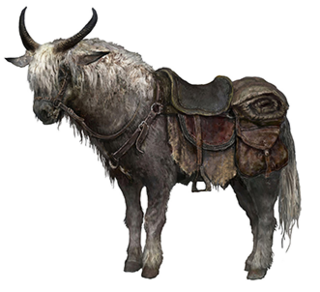Related Research Articles

The Legend of Zelda: Majora's Mask is a 2000 action-adventure game developed and published by Nintendo for the Nintendo 64. It was the second The Legend of Zelda game to use 3D graphics, following Ocarina of Time (1998). Designed by a creative team led by Eiji Aonuma, Yoshiaki Koizumi, and Shigeru Miyamoto, Majora's Mask was completed in less than two years. It featured enhanced graphics and several gameplay changes, but reused elements and character models from Ocarina of Time, which the game's creators called a creative decision made necessary by time constraints.

Fallout is a media franchise of post-apocalyptic role-playing video games—and later action role-playing games—created by Tim Cain and Leonard Boyarsky, at Interplay Entertainment. The series is set during the 21st, 22nd, and 23rd centuries, and its atomicpunk retrofuturistic setting and art work are influenced by the post-war culture of the 1950s United States, with its combination of hope for the promises of technology and the lurking fear of nuclear annihilation. A forerunner of Fallout is Wasteland, a 1988 game developed by Interplay Productions. Fallout is regarded as a spiritual successor to Wasteland.

The Legend of Zelda: The Wind Waker is an action-adventure game developed and published by Nintendo for the GameCube. An installment in The Legend of Zelda series, it was released in Japan on December 13, 2002, in North America on March 24, 2003, and in Europe on May 2, 2003.
A warp, also known as a portal or teleporter, is an element in video game design that allows a player character instant travel between two locations or levels. A specific area that allows such travel is referred to as a warp zone. A warp zone might be a secret passage, accessible only to players capable of finding it, but they are also commonly used as a primary mean of travel in certain games. Warps might be deliberately installed within puzzles, be used to avoid danger in sections of a game that have been previously accomplished, be something a player can abuse for cheating, or be used as a punishment to a player straying from the "correct" path.
The Legend of Zelda: The Minish Cap is an action-adventure game and the twelfth entry in The Legend of Zelda series. Developed by Capcom and Flagship, with Nintendo overseeing the development process, The Minish Cap was released for the Game Boy Advance in Japan and Europe in 2004 and in North America and Australia the following year.
Fallout 3 is a 2008 action role-playing game developed by Bethesda Game Studios and published by Bethesda Softworks. The third major installment in the Fallout series, it is the first game to be developed by Bethesda after acquiring the rights to the franchise from Interplay Entertainment. The game marks a major shift in the series by using 3D graphics and real-time combat, replacing the 2D isometric graphics and turn-based combat of previous installments. It was released worldwide in October 2008 for Microsoft Windows, PlayStation 3, and Xbox 360.

In video games, an open world is a virtual world in which the player can approach objectives freely, as opposed to a world with more linear and structured gameplay. Notable games in this category include The Legend of Zelda (1986), Grand Theft Auto V (2013) and Minecraft (2011).

Navi is a fictional fairy who acts as series protagonist Link's navigator throughout the 1998 Nintendo 64 video game The Legend of Zelda: Ocarina of Time. She was voiced by Kaori Mizuhashi. Navi performs a variety of functions within the game, including being a companion and guide to Link, providing the player with advice and being a focal point for the game's Z-lock targeting combat system. Other characters in The Legend of Zelda series have served in similar roles, including Tatl, Midna, and Fi. When designing the reticle for the game, designer Yoshiaki Koizumi made a ball of light with wings, naming it "Fairy Navigation System" before naming it Navi. She has been widely criticised by players and critics for her repetitive interruptions in gameplay, particularly with the prompt "Hey! Listen!", though some have argued that she was a valuable companion in the game.

A loading screen is a screen shown by a computer program, very often a video game, while the program is loading or initializing.

The Legend of Zelda: Breath of the Wild is a 2017 action-adventure game developed and published by Nintendo for the Nintendo Switch and Wii U. Set at the end of the Zelda timeline, the player controls an amnesiac Link as he sets out to save Princess Zelda and prevent Calamity Ganon from destroying the world. Players explore the open world of Hyrule while they collect items and complete objectives such as puzzles or side quests. Breath of the Wild's world is unstructured and encourages exploration and experimentation; the story can be completed in a nonlinear fashion.
Teleportation is the theoretical transfer of matter and/or energy from one point to another without traversing the physical space between them. It is a common subject in science fiction and fantasy literature, film, video games, and television. In some situations, teleporting is presented as time traveling across space.

Cube World is an action role-playing game developed and published by Picroma for Microsoft Windows. Wolfram von Funck, the game's designer, began developing the game in June 2011, and was later joined by his wife, Sarah. An alpha version of the game was released on July 2, 2013, but saw sparse updates and communication from von Funck, with many considering the game to be vaporware until he officially released it on September 30, 2019.
The study of religion and video games is a subfield of digital religion, which the American scholar of communication, Heidi Campbell, defines as "Religion that is constituted in new ways through digital media and cultures.". Video games once struggled for legitimacy as a cultural product, today, however, they are both business and art. Video games increasingly turn to religion not just as ornament but as core elements of their video game design and play. Games involve moral decision, rely on invented religions, and allow users to create and experience virtual religious spaces. As one of the newest forms of entertainment, however, there is often controversy and moral panic when video games engage religion, for instance, in Insomniac Games' use of the Manchester Cathedral in Resistance: Fall of Man. Concepts and elements of contemporary and ancient religions appear in video games in various ways: places of worship are a part of the gameplay of real-time strategy games like Age of Empires; narratively, games sometimes borrow themes from religious traditions like in Mass Effect 2.

Sif, the Great Grey Wolf is a character and boss in the 2011 action role-playing game Dark Souls. A wolf that has grown to a massive size, it protects the grave of its deceased master, Knight Artorias the Abysswalker, and the Covenant of Artorias, a ring that allows its wearer to traverse the Abyss, a dark void normally impassable by mortals. The fight with Sif has been cited by critics as one of the most memorable in the game due to the role reversal of the player as a transgressor. Sif also functions as an optional ally in the game's DLC.

Endless Express is a first-person simulation video game developed in 2014 by Florian Veltman, Alexandre Taillefert, Martin Gugger, Felix Meunier, and Baptiste Virot. The game was first created as part of a 7-day game jam, but was later "reimagined" and re-titled "The Endless Express" in 2016, however, the project was discontinued, with its work-in-progress build publicly released. Endless Express was released on Microsoft Windows, MacOS, and Linux systems.

Fallout 76 is a 2018 action role-playing video game developed by Bethesda Game Studios and published by Bethesda Softworks. It is an installment in the Fallout series and a prequel to previous entries. Initially set in the year 2102, players control a resident of Vault 76 who must venture out into the dilapidated open world known as "Appalachia" in order to re-colonize the region, and uncover a mysterious plague that has killed off its inhabitants. Fallout 76 is Bethesda Game Studios' first multiplayer game; Bethesda developed the game using a modified version of its Creation Engine, which allowed the accommodation of multiplayer gameplay and a more detailed game world than in previous games.
Zfg is an American speedrunner and streamer known for his The Legend of Zelda: Ocarina of Time gameplay. He has held various records in speedrunning the game and its alternative version Master Quest, most notably the 100% completion category for the original game, for which he had held the record since mid-2015. He was the first person to complete Ocarina of Time to 100% in under four hours. He currently holds the record in the 100% SRM category with a time of 3 hours, 0 minutes, and 39 seconds, as of December 2022.

Dujanah is an art video game developed and published by Jack King-Spooner, a Scottish indie game developer. It was released on September 19, 2017. The game follows Dujanah, a Muslim woman in a fictional country under the occupation of foreign powers in a stylized magic realist–style world as she tries to find out what happened to her husband and daughter. The game focuses on the theme of death, and explores it through the stories of people that Dujanah meets as she walks through her country. Reception to Dujanah was positive, with praise focused on its themes and storytelling.
A Soulslike is a subgenre of action role-playing games known for high levels of difficulty and emphasis on environmental storytelling, typically in a dark fantasy setting. It had its origin in Demon's Souls and the Dark Souls series by FromSoftware, the themes and mechanics of which directly inspired several other games. Soulslike games developed by FromSoftware themselves have been specifically referred to as Soulsborne games, a portmanteau of Souls and Bloodborne. The "Soulslike" name has been adopted by a number of critics and developers. However, there have also been questions whether it is a true genre or a collection of shared mechanics.

Torrent is a fictional horse in the 2022 action role-playing game and soulslike Elden Ring developed by FromSoftware. A ghostly being known as a "spectral steed", Torrent chooses the player character as his new owner. He subsequently assists the player in their quest to become Elden Lord, the restorer of a magical artifact called the Elden Ring, by letting them more easily traverse the game's world, the Lands Between. The first rideable animal, or "mount", in the Soulsborne series, he can be summoned and sent away using a special gold whistle bequeathed to the player early on in the game by the character Melina.
References
- 1 2 "Does fast travel help or hurt games?". GameCrate. 2015-02-14. Archived from the original on 2015-02-14. Retrieved 2018-02-26.
- 1 2 3 "Journeys In Games: Let's Talk About Fast Travel". Rock, Paper, Shotgun. 2015-06-26. Retrieved 2018-02-26.
- ↑ Hernandez, Patricia. "You Should Try Fallout 4 Without Fast Travel". Kotaku. Retrieved 2018-02-26.
- ↑ Hamilton, Kirk. "If You're Playing Zelda, Try Fast Traveling Less". Kotaku. Retrieved 2018-02-26.